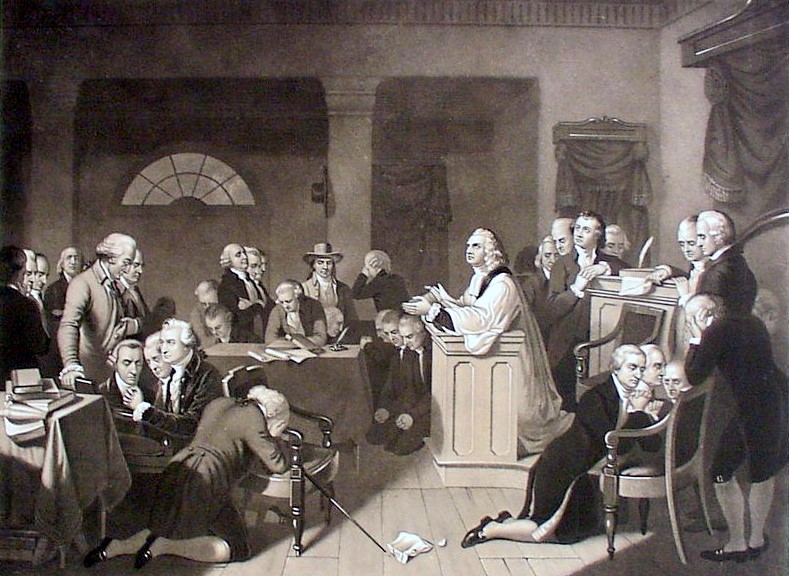 RICHMOND, Va. — The full Fourth Circuit Court of Appeals in Virginia has ruled that the prayers presented during a North Carolina commission’s meetings cannot be exclusively Christian, asserting that representing only one faith at the public-attended government events violates the Establishment Clause of the U.S. Constitution.
RICHMOND, Va. — The full Fourth Circuit Court of Appeals in Virginia has ruled that the prayers presented during a North Carolina commission’s meetings cannot be exclusively Christian, asserting that representing only one faith at the public-attended government events violates the Establishment Clause of the U.S. Constitution.
“We conclude that the Constitution does not allow what happened in Rowan County,” wrote Judge Harvie Wilkinson wrote on behalf of the 10-5 majority. “The prayer practice served to identify the government with Christianity and risked conveying to citizens of minority faiths a message of exclusion.”
As previously reported, the American Civil Liberties Union (ACLU) and ACLU of North Carolina Legal Foundation (ACLU-NCLF) had filed suit against the Rowan County commissioners in March 2013, complaining that their invocations have asserted that “there is only one way to salvation, and that is Jesus Christ,” and thank the Lord for the “virgin birth,” the “cross at Calvary” and “the resurrection.”
“I want my local government to be open and welcoming to people of all beliefs,” Nan Lund, a local resident who was among three plaintiffs named in the suit, stated in a news release announcing the legal challenge. “But when officials begin a public meeting with prayers that are specific to only one religious viewpoint, I feel unwelcome and excluded.”
In July 2013, federal Judge James A. Beaty Jr., nominated to the bench by then-President Bill Clinton, sided with the ACLU and the three complainants, ordering the commissioners to end their Christian prayer practice while the case moves forward in court.
Two years later, Beaty issued his final decision, declaring the prayers predominantly in Jesus’ name to be unconstitutional.
“The practice fails to be nondiscriminatory, entangles government with religion, and over time, establishes a pattern of prayers that tends to advance the Christian faith of the elected commissioners at the expense of any religious affiliation unrepresented by the majority,” he wrote.
Beaty pointed to the 2014 Supreme Court ruling in Greece v. Galloway, which approved city council prayers in Greece, New York that were predominantly—but not solely—Christian. Beaty asserted that Rowan County’s practice was different because the prayers were only Christian since its commissioners all identify as Christians.
However, in September 2016, the Fourth Circuit Court of Appeals used Greece v. Galloway to uphold the commission’s prayers. It disagreed with Beaty’s interpretation of the high court decision.
“In essence, the district court treated the Supreme Court’s jurisprudential silence on lawmaker-led prayer as conclusively excluding legislators from being permissible prayer-givers to their own legislative bodies,” wrote Judge G. Steven Agee, nominated to the bench by then-President George W. Bush.
“On a broader level, and more importantly, the very ‘history and tradition’ anchoring the Supreme Court’s holding in Town of Greece underscores a long-standing practice not only of legislative prayer generally but of lawmaker-led prayer specifically. Opening invocations offered by elected legislators have long been accepted as a permissible form of religious observance,” he said.
The ACLU consequently appealed to the full Fourth Circuit of 15 judges, which agreed to hear the case en banc. Following oral argument in March, the court issued its ruling on Friday. It said that while the commission may present prayers during public meetings, they cannot be exclusively Christian.
“The great promise of the Establishment Clause is that religion will not operate as an instrument of division in our nation,” wrote Judge Harvie Wilkinson. “Consistent with this principle, there is a time honored tradition of legislative prayer that reflects the respect of each faith for other faiths and the aspiration, common to so many creeds, of finding higher meaning and deeper purpose in these fleeting moments each of us spends upon this earth.”
“Instead of drawing on this tradition, Rowan County elevated one religion above all others and aligned itself with that faith. It need not be so,” he continued. “As the history of legislative invocations demonstrates, the desire of this good county for prayer at the opening of its public sessions can be realized in many ways that further both religious exercise and religious tolerance.”
Judge Agee again dissented, stating that Rowan County’s prayers are no different than those analyzed in the U.S. Supreme Court’s Greece v. Galloway ruling.
“[The] Town of Greece’s reference to a ‘pattern of prayers . . . over time’ must be understood in the context of that case. The period at issue there was 1999 to 2010, which encompassed some 120 monthly meetings, and for all but the last three years in that record, the prayers were offered solely from a Christian tradition. Even during those last three years, only four prayers were given from a non-Christian faith tradition,” he noted.
“If those circumstances did not constitute an impermissible pattern of prayers that advanced Christianity or otherwise crossed the line, neither do the facts of this case,” Agee said.
“In short, the prayers actually offered in [Marsh v. Chambers] and Town of Greece contained the same sort of pleas to the Christian God and to Jesus Christ, the same recognition of a Christian tenet of salvation and dependence on God’s favor, and the same generalized exhortations to obedience to Christian teachings as those prayers singled out for concern by the majority,” he noted. “If the prayers in Marsh and Town of Greece did not independently merit concern as to content, then neither do the prayers offered in Rowan County.”
The commission is considering appealing the ruling to the U.S. Supreme Court.
Become a Christian News Network Supporter...


